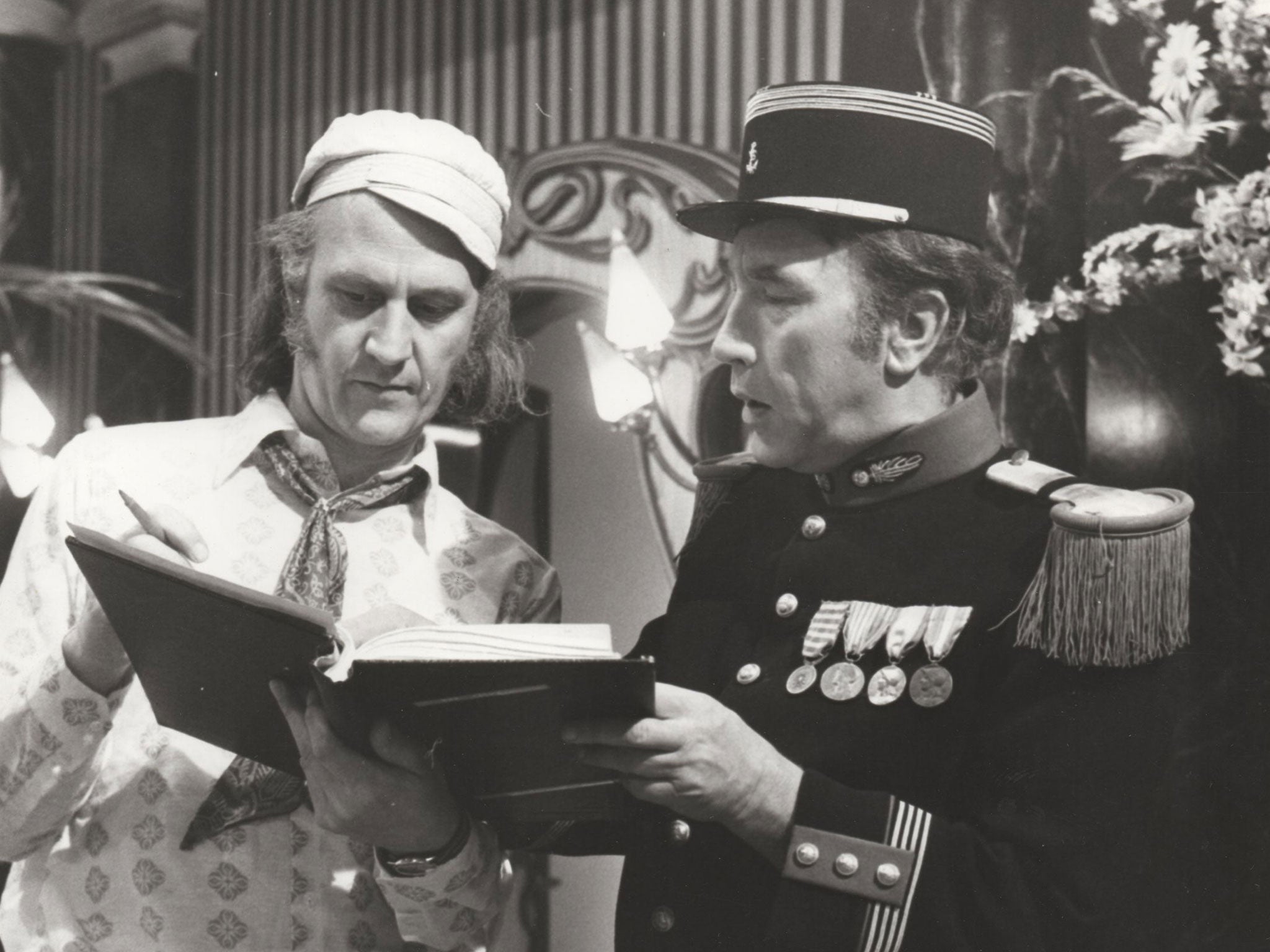Bob Kellett: Director, writer and producer best known for his work with Howerd and Barker
His ‘Boy Stroke Girl’ was about a couple whose son falls in love with a black transvestite

As the British film industry went into decline at the turn of the 1960s, Bob Kellett found success in directing television stars in big-screen comedies, from Ronnie Barker in a variation on his lewd aristocrat character Lord Rustless to the “oohs” and “aahs” of Frankie Howerd and farces starring Danny La Rue and Brian Rix.
In Futtocks End (1969), a wordless second feature with a soundtrack of only music, incoherent mutterings and grunts and groans, Barker played the randy General Futtock, who invites an oddball group of friends to his country estate for the weekend, with Michael Hordern acting his lecherous butler.
Although one critic complained that "the whole venture reeks of ancient music-hall jokes", Kellett enjoyed the experience and was happy to allow Barker to share in decision-making, something the star did increasingly on television as his own success grew. "He and I worked as a team," Kellett told Barker's biographer, Richard Webber. "Ronnie was always by my side. If I had an idea, I'd discuss it with him. It was easy and great fun."
Jokes considered risqué for the time by some were also to the fore in Up Pompeii (1971), a film version of the television comedy starring Frankie Howerd and loosely based on his role as a Roman slave in the stage musical A Funny Thing Happened on the Way to the Forum. Kellett successfully transferred to the big screen the television series' double entendres and asides to camera, and Up Pompeii became the 10th most popular film at the British box office in 1971. However, two follow-ups, Up the Chastity Belt (1971) and Up the Front (1972), were inferior in quality.
When Danny La Rue was persuaded by writer Ted Willis to star in the female impersonator's first film, the wartime farce Our Miss Fred (1972), he was grateful to director Kellett for keeping the on-set atmosphere happy. Then came another farce, Michael Pertwee's Don't Just Lie There, Say Something! (1973), featuring the trouser-dropping Brian Rix and previously a stage hit at the Garrick Theatre.
From this string of films at such a desperate time for British cinema, it was only a short step to the sex comedies of the time. Kellett directed Spanish Fly (1976), starring Leslie Phillips as the old schoolfriend visiting Terry-Thomas's aristocrat in Minorca for a photoshoot with young women modelling underwear. Topless scenes added to the titillation. Kellett also directed the big-screen versions of two popular television sitcoms, The Alf Garnett Saga (1972), with Warren Mitchell reprising his role as the bigot from Till Death Us Do Part, and Are You Being Served? (1977).
Born in Lancaster, the son of a soldier who later owned a tea plantation in Ceylon, Kellett attended Bedford School, where he captained the rowing team. After various jobs as a sales rep, he became a writer with the advertising agencies Foote, Cone & Belding and Notley. In 1950, he moved to Wessex Films, working as script editor for the producer Ian Dalrymple on Thomas Hardy adaptations such as Far from the Madding Crowd, but they never saw the light of day.
Kellett joined the recently launched ITV London weekday franchise holder, Associated-Rediffusion, in 1956. He contributed scripts to the first series of the detective drama Shadow Squad (1957) and, from 1957, the advertising magazine Jim's Inn, featuring Jimmy Hanley.
In 1960, three years before such ad-mags were banned on television, Kellett set up his own company, Gannet Films, to produce and direct short documentaries for the Central Office of Information and businesses. He also worked for Rank, as well as Dormar Productions, producing an annual film for its owner, the builder Tersons.
After he injected comedy into one of these, Dormar, with an eye to publicity for the building industry, agreed to finance Kellett's first feature film as producer, the wordless A Home of Your Own (1964), starring Ronnie Barker as a worker mixing cement on a building site where a couple – the husband played by Richard Briers – buy a home. Kellett spent much time hawking the film round distributors, until British Lion finally took it.
A Home of Your Own also established the "grumble and grunt" style that Kellett and Barker would employ later in Futtocks End and was continued by the star in other screen productions such as The Picnic. Kellett also used it in the 1965 comedy San Ferry Ann, starring Joan Sims, Wilfrid Brambell and Barbara Windsor, which he wrote and produced. He also produced the comedy Just Like a Woman (1968), featuring Wendy Craig.
Following Futtocks End, his first feature film as director, Kellett was hired by producer Ned Sherrin to make the Frankie Howerd comedies. With Kellett directing, Sherrin wrote – with Caryl Brahms – Girl Stroke Boy (1971), not a 1970s sex comedy but a more daring X-certificate comedy-drama, starring Michael Hordern and Joan Greenwood as a couple whose son falls in love with a black transvestite.
Kellett later directed episodes of Space: 1999 (1975, 1976) and the series Seagull Island (1981) for television, and was an executive producer with the Children's Film Foundation (1980-82). He also worked with film director Lewis Gilbert, as co-adapter of Haunted (1995), from James Herbert's novel, and line producer on Before You Go (2002), starring Julie Walters. He was second unit director on both.
Kellett's youngest son, Ben, is a television director.
Robert Ryerson Kellett, director, producer and writer: born Lancaster 25 December 1927; married 1958 Annie Clarke (two sons, three daughters); died Westergate, West Sussex 27 November 2012.
Subscribe to Independent Premium to bookmark this article
Want to bookmark your favourite articles and stories to read or reference later? Start your Independent Premium subscription today.

Join our commenting forum
Join thought-provoking conversations, follow other Independent readers and see their replies